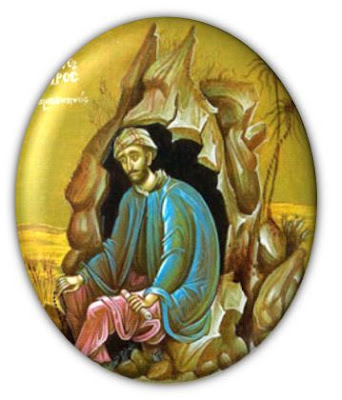Saint Michael, Bishop of Synnáda,
the Confessor
Michael, this holy and learned hierarch, dedicated himself to the service of Christ from early childhood. Together with St. Theophylact of Nicomedia, he lived a life of asceticism.
At one time during a period of drought, these two saints, by their prayers, brought forth abundant rain on the earth. Because of his ascetical and chaste life from his early youth, he was chosen and consecrated bishop of Synnáda by Patriarch Tarásios. He participated in the Seventh Ecumenical Council [Nicaea, 783 A.D.]. At the request of the emperor, he went to Caliph Harun-al-Rashid to conduct negotiations for peace. During the reign of the nefarious Leo the Armenian, Michael was removed from his episcopal throne because of his veneration of icons and was banished into exile, where in misery and poverty and, remaining faithful to Orthodoxy, died in the year 818 A.D. and took up habitation in the kingdom of Christ the King.
Acts 25:13-19 KJV
13 And after certain days king Agrippa and Bernice came unto Caesarea to salute Festus.
14 And when they had been there many days, Festus declared Paul's cause unto the king, saying, There is a certain man left in bonds by Felix:
15 About whom, when I was at Jerusalem, the chief priests and the elders of the Jews informed me, desiring to have judgment against him.
16 To whom I answered, It is not the manner of the Romans to deliver any man to die, before that he which is accused have the accusers face to face, and have licence to answer for himself concerning the crime laid against him.
17 Therefore, when they were come hither, without any delay on the morrow I sat on the judgment seat, and commanded the man to be brought forth.
18 Against whom when the accusers stood up, they brought none accusation of such things as I supposed:
19 But had certain questions against him of their own superstition, and of one Jesus, which was dead, whom Paul affirmed to be alive.
Saint John 16:23-33 KJV
23 And in that day ye shall ask me nothing. Verily, verily, I say unto you, Whatsoever ye shall ask the Father in my name, he will give it you.
24 Hitherto have ye asked nothing in my name: ask, and ye shall receive, that your joy may be full.
25 These things have I spoken unto you in proverbs: but the time cometh, when I shall no more speak unto you in proverbs, but I shall shew you plainly of the Father.
26 At that day ye shall ask in my name: and I say not unto you, that I will pray the Father for you:
27 For the Father himself loveth you, because ye have loved me, and have believed that I came out from God.
28 I came forth from the Father, and am come into the world: again, I leave the world, and go to the Father.
29 His disciples said unto him, Lo, now speakest thou plainly, and speakest no proverb.
30 Now are we sure that thou knowest all things, and needest not that any man should ask thee: by this we believe that thou camest forth from God.
31 Jesus answered them, Do ye now believe?
32 Behold, the hour cometh, yea, is now come, that ye shall be scattered, every man to his own, and shall leave me alone: and yet I am not alone, because the Father is with me.
33 These things I have spoken unto you, that in me ye might have peace. In the world ye shall have tribulation: but be of good cheer; I have overcome the world.

All of Your Heart
St. Peter of Damaskos




No comments:
Post a Comment